Treadmill VS Incline Trainer: Exploring the Differences and Benefits
Author:
Unlock your full potential by engaging with our experts and community! Have questions about your fitness journey or looking for expert advice on weightlifting techniques? Don’t hesitate — leave a comment below and Ihor Shymechko will provide a personalized answer and insights to help you reach your goals.
Torokhtiy is reader-supported. Some links are affiliate links, and we may earn a commission at no extra cost to you. See our disclosure page for details.
When you think about cardio or burning those extra calories, running on a treadmill is probably the first thing that comes to mind. Although recently, incline trainers are also gaining quite attention for cardio workouts. But what is the difference between a treadmill vs. incline trainer, and which one is the better fit for you? In this article, I’ll dive deep into all the differences between the two machines and discuss their pros and cons. So continue reading ahead to find out more.
So which is better: incline trainer or treadmill? The main difference between an incline trainer vs treadmill is its incline range, which is up to 40 degrees for incline trainers and 10-15 degrees for treadmills. It makes incline trainers a better fit for intense cardio and faster calorie burning.
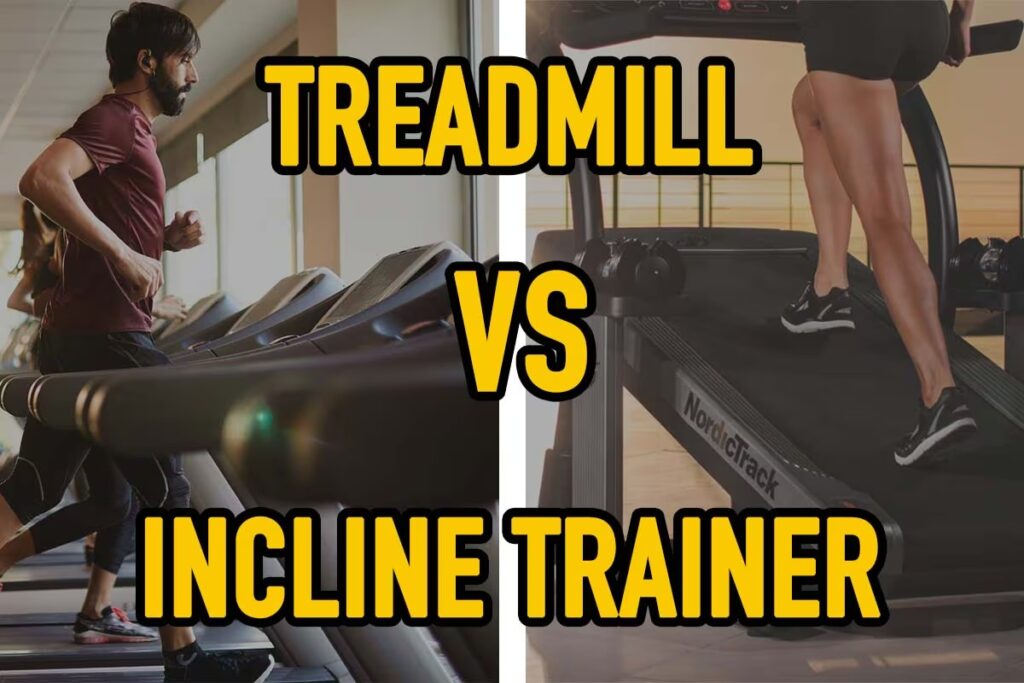
What Is A Treadmill?
A treadmill is an exercise equipment that is used for cardio training. It has a continuously moving belt for the user to run or walk on. This belt is powered by a motor, the speed of which can be adjusted based on your preference.
Whether you’re at a public gym or making a home gym, treadmills are an absolute staple. This is because of their ease of use and how they’re proven to show promising results in a wide range of users and positively impact work performance and physical activity.
It is used for cardio training or as a warm-up before strength training exercises.
What Is An Incline Trainer?
Let’s start comparing the difference between an incline trainer and treadmill.
An incline trainer is pretty similar to a treadmill, except the belt used in it is inclined at an angle of up to 40 degrees. It simulates the path of a steep hill. The difference between an incline trainer and treadmill is that it requires much more effort and intensity, so more calories are burned in less time, making it great for low-impact yet more efficient workouts.
Incline trainers are generally used at gyms but can also be used at home. They are beneficial for activating the glutes, hamstring, and calf muscles without putting much impact on the knees and other joints. Using such equipment is great for runners as it helps in muscle activation.
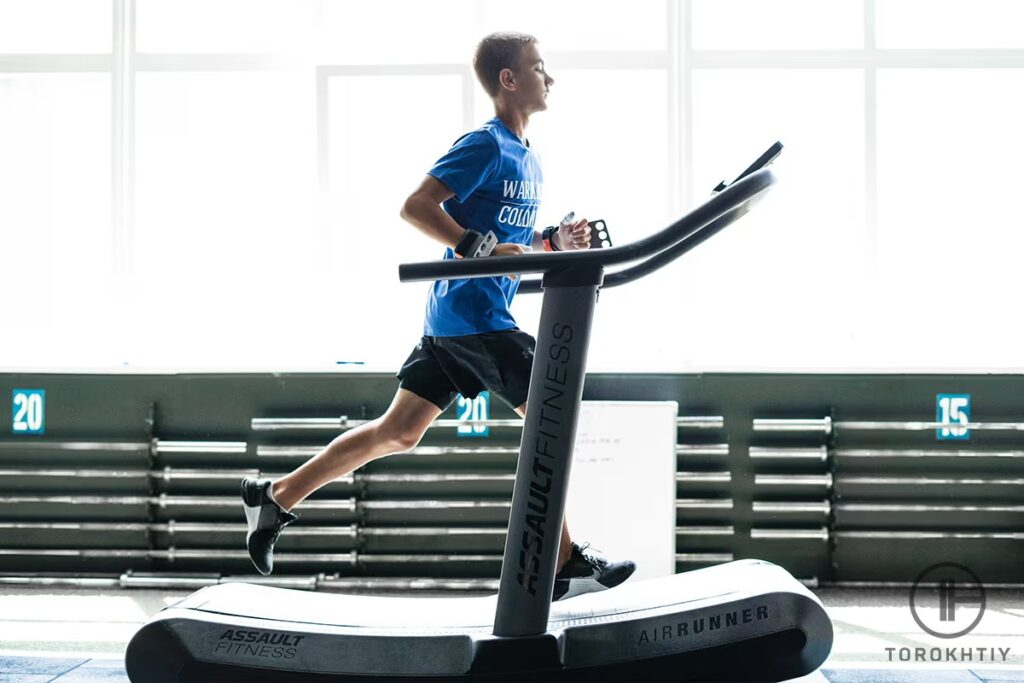
Treadmill Vs. Incline Trainer
Now that you know what both these exercise equipment are for, let’s talk about some factors that set incline trainers apart from regular treadmills. Here are those factors, along with their brief description.
1. Structure
A regular treadmill has a straight deck. It may give you an incline range of up to 15 degrees. Treadmills come in various structural sizes ranging from foldable, compact treadmills to bulkier and sturdier options used in public gyms.
On the other hand, an incline trainer is bigger and needs considerable space for it. Since incline trainers offer an incline up to 40 degrees, they have a wider range of training options, from simple running to intense uphill climbing.
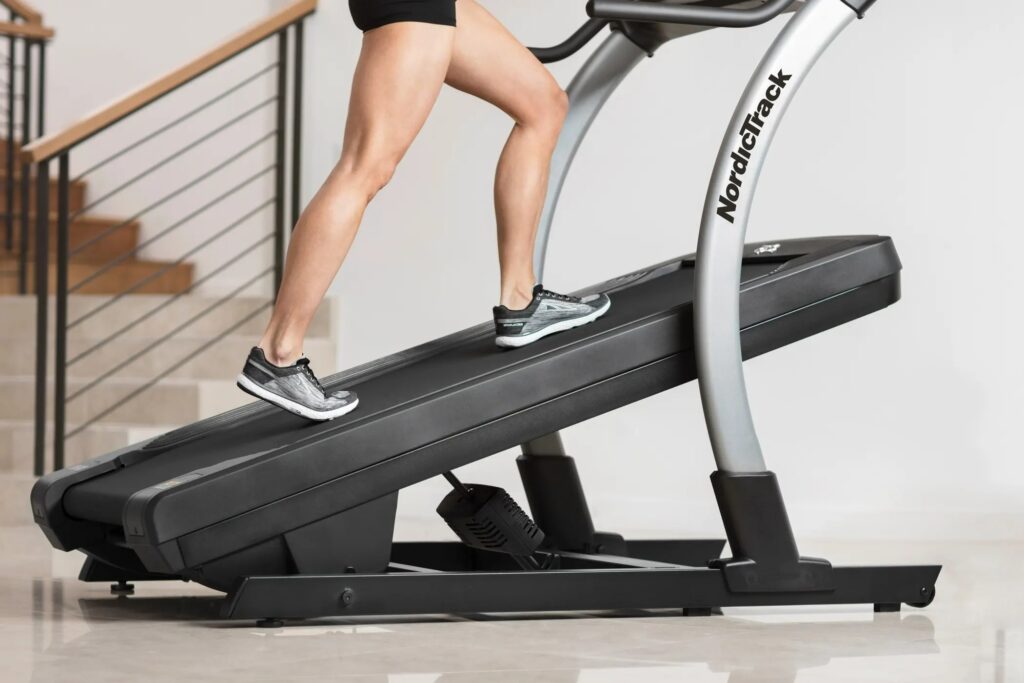
2. Motor
The simple straight deck of a treadmill makes it easy to run even when not much power is provided. It does not require a very powerful motor.
Alternatively, an incline treadmill motor is much more powerful, and this additional power is necessary to maintain a smooth and sturdy user experience even at a 40-degree incline.
3. Calorie Burn
The number of calories burnt on an incline trainer is much greater than the calories burned on a treadmill during the same time period. This is because you are working against gravity on an incline trainer, and muscle activity is greater.
4. Workout Type
Jogging and running on a treadmill is a high-impact workout. During such exercise, the impact on the joints is much higher. Alternatively, using an incline trainer is a low-impact exercise and is better for joints.
5. Price
The comparison of the price of an incline trainer vs regular treadmill shows that incline trainers are more expensive as compared to regular treadmills.
| Difference | Treadmill | Incline Trainer |
|---|---|---|
| Structure | Compact | Spacious |
| Motor | Less powerful | More Powerful |
| Calorie Burn | Comparatively less | Higher |
| Workout Type | High impact | Lower Impact |
| Price | Less expensive | More pricey |
Treadmill Vs. Incline Trainer: Summary
Still confused about which one suits your requirements? In this section, we will summarize the pros and cons of each machine to help you decide whether a treadmill or incline trainer is the better fit for you.
1. Pros/Cons Of Treadmill
Positives:
Could be better:
2. Pros/Cons Of Incline Trainer
Positives:
Could be better:
Our Recommendations
There’s a wide variety of brands offering good quality treadmills and incline trainers. It gets very difficult to find out which one is better. That’s why we are here with honest treadmills and incline trainers’ reviews.
1. ProForm Carbon TLX
- Dimensions: 35.1’’W x 74.3’’D x 59.1’’H
- Display size: 7’’
- App: iFit
- Product weight: 249 lbs
- Weight capacity: 300 lbs
- Running deck size: 20’’x60’’
- Speed range: 0-12 mph
- Incline/decline options: 0-12%
- Additional features: ProShox cushioning, folding design
- Warranty: 10-year frame, 1-year parts, 1-year labor
The Pro-Form Carbon TLX may not be the most compact treadmill out there, but at least you won’t feel restricted while using it. It weighs 249 pounds in box and it can support up to 300 pounds of weight. The dimensions are 74.3” D x 35.1” W x 59.1” H, which makes it ideal for people of all heights. The spacious belt measures 20’’x60’’.
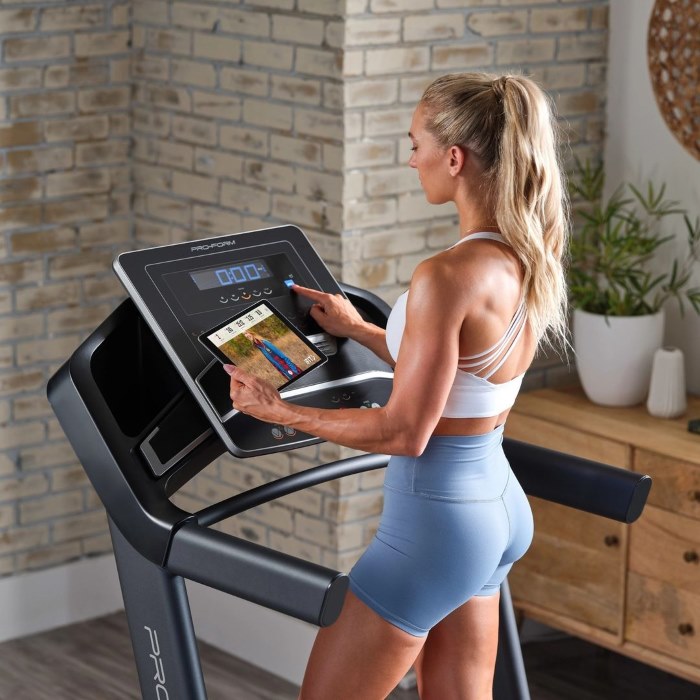
Once you’re done with using it, simply fold it and store it away.
And that’s not it. The treadmill offers interactive training sessions, and you can stream global and studio workout sessions on it, which makes your workouts a lot more personalized and productive.
2. NordicTrack x22i Incline Trainer
The NordicTrack x22i Incline trainer is a top-notch trainer with an incline range of 40% to -6%. This treadmill weighs 417 lbs, and its dimensions are 70L * 39W * 72.5H. The maximum user weight capacity is about 300 lbs. You also get a 22-inch smart HD touchscreen.
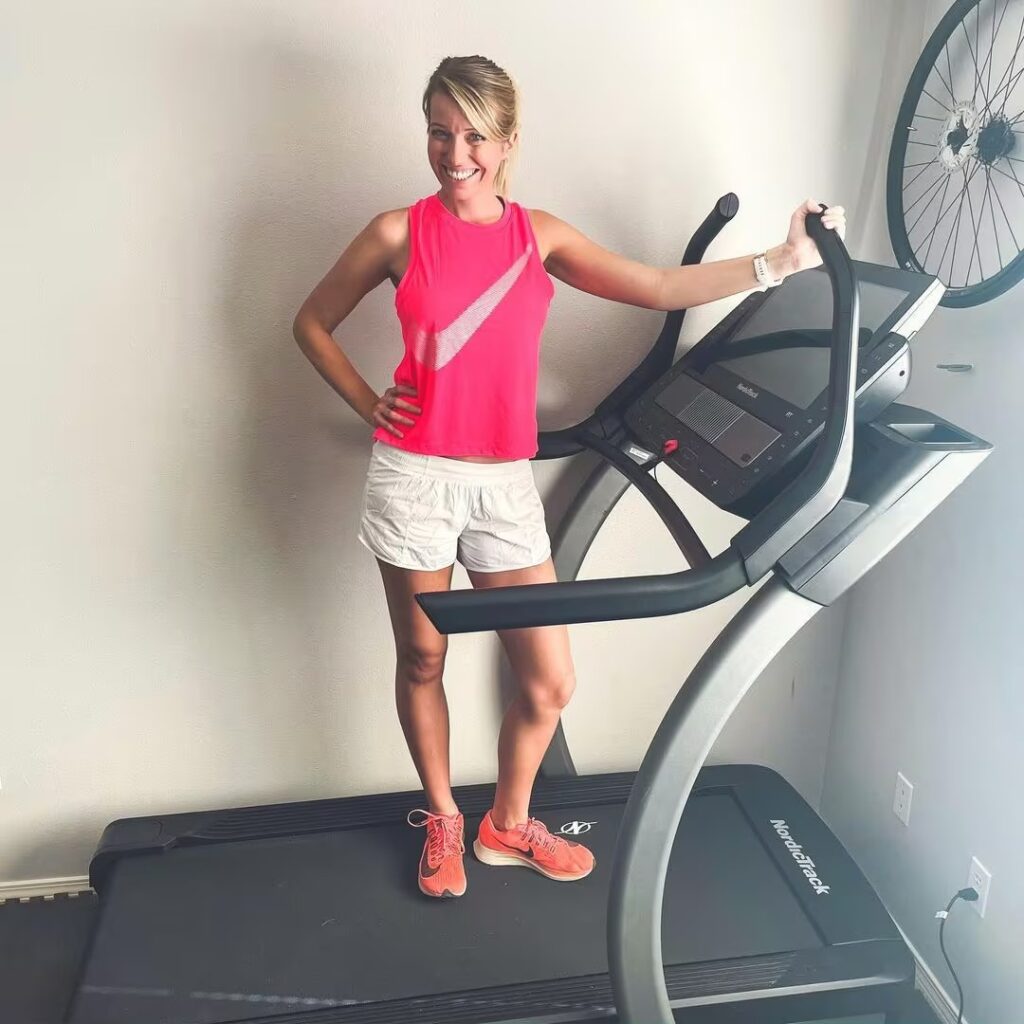
Although you might consider it pricy, the range of angles and veridicality of angles that it offers is unmatched.
FAQ
Are Incline Trainers Better Than Treadmills?
Incline trainer vs treadmill: which one is better? If you want to engage more muscles and do a low-impact exercise, then using an incline trainer is better than using a treadmill. But if you want to have compact equipment and be able to walk or jog, then treadmills are better.
Are Treadmill Incline Workouts Effective?
Incline workouts are very effective, especially if you want fast calorie burn and want to train your glutes, hamstring, and calf muscles.
Conclusion
An incline trainer takes up more space and is pricey, but it is great if you want to do low-impact exercise to train your lower body muscles and burn more calories. Alternatively, a treadmill offers high-impact exercise just like a run, and lesser muscles are involved.
Let us know in the comments if you would prefer to opt for an incline trainer or do you want to stick to your standard treadmill.
Also read:
- What Incline Should You Walk on a Treadmill
- How Much Is a Mile on a Treadmill
- How Long Does a Treadmill Last
- How to Adjust Treadmill Belt
- Best Walking Shoes for Treadmill
References:
- The Effects of Walking while Working // NCBI: https://www.ncbi.nlm.nih.gov/pmc/articles/PMC3930588/
- The effects of incline // PubMed: https://pubmed.ncbi.nlm.nih.gov/24172721/
- Predicting the Metabolic Cost of Incline Walking // NCBI: https://www.ncbi.nlm.nih.gov/pmc/articles/PMC4504736/
- Low Impact Exercise // Teacher Retirement System: https://www.trs.texas.gov/Pages/healthcare_news_201809_lowimpact_exercise.aspx
- Effects of Treadmill Incline // PubMed: https://pubmed.ncbi.nlm.nih.gov/26518274/
Why Trust Us?
With over 20 years in Olympic weightlifting, strength training, nutrition coaching, and general fitness our team does its best to provide the audience with ultimate support and meet the needs and requirements of advanced athletes and professional lifters, as well as people who strive to open new opportunities and develop their physical capabilities with us.
By trusting the recommendations of our certified experts in coaching, nutrition, and sports training programming, as well as scientific consultants, and physiotherapists, we provide you with thorough, well-considered, and scientifically proven content. All the information given in the articles concerning workout programming, separate exercises, and athletic performance, in general, is based on verified data.
The product testing process is described in more detail here.
Author: Ihor Shymechko
Pro Olympic Weightlifter, Coach
Best Results: Snatch – 208 kg,
C&J – 240 kg
Ihor has been a professional weightlifter since 1996, boasting over two decades of competition experience. His notable achievements include clinching the European Championship in 2009 and securing a silver medal in the 105kg division at the Senior World Championships in 2011. Ihor represented his country in the 2008, 2012, and 2016 Summer Olympics. After retiring from competitive weightlifting, he transitioned to coaching, leveraging his vast experience to guide athletes who now compete on both national and international stages.



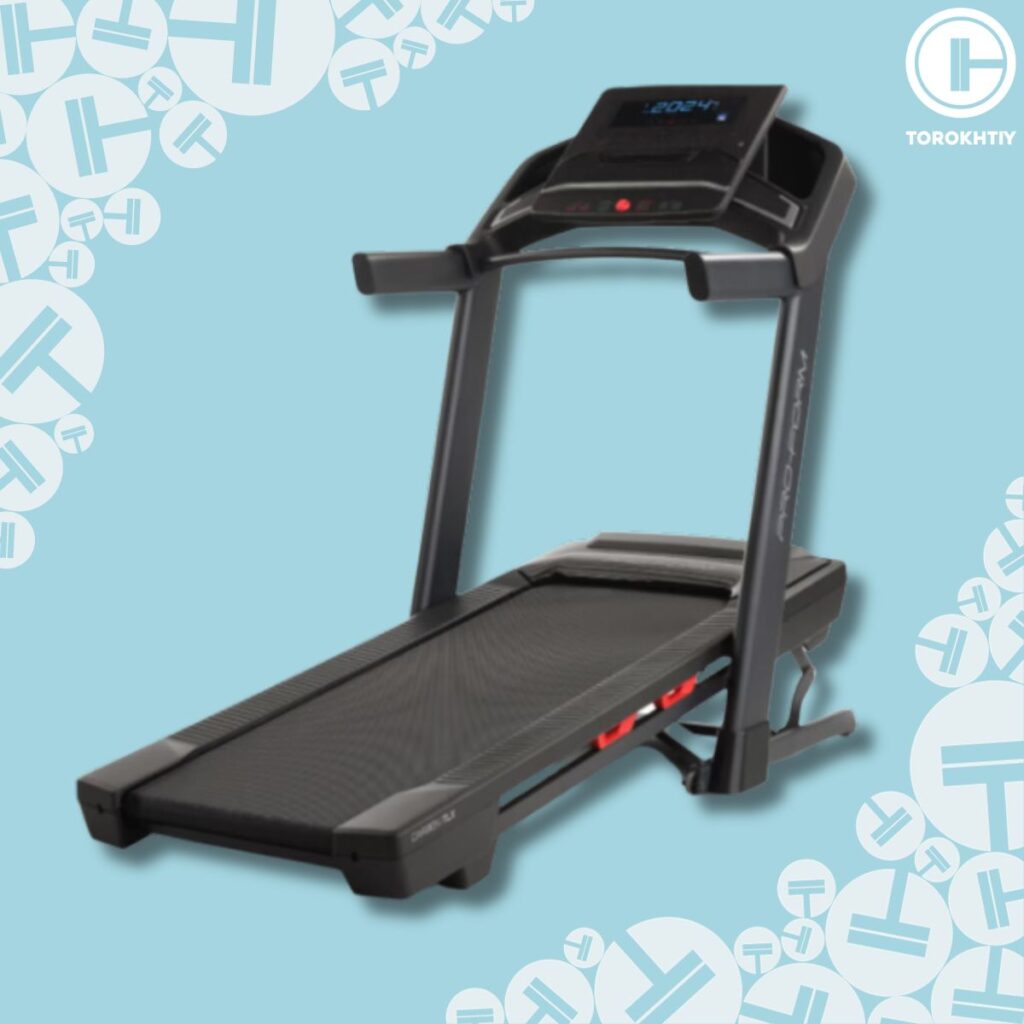
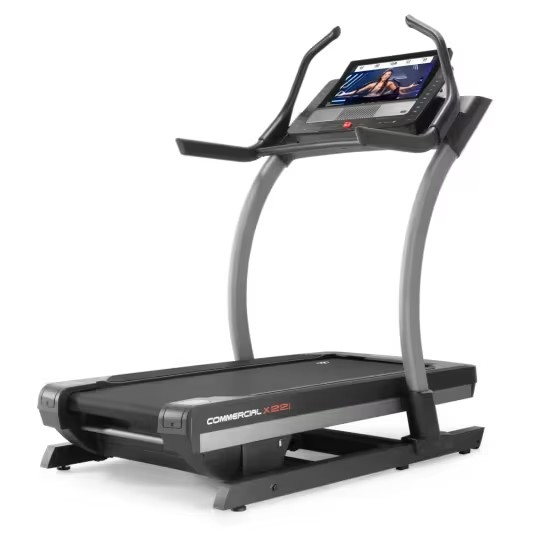
Still have questions after reading our article? Unlock your full potential by engaging with our experts and community! Don’t hesitate — leave a comment below and Ihor Shymechko will provide a personalized answer and insights to help you reach your goals.